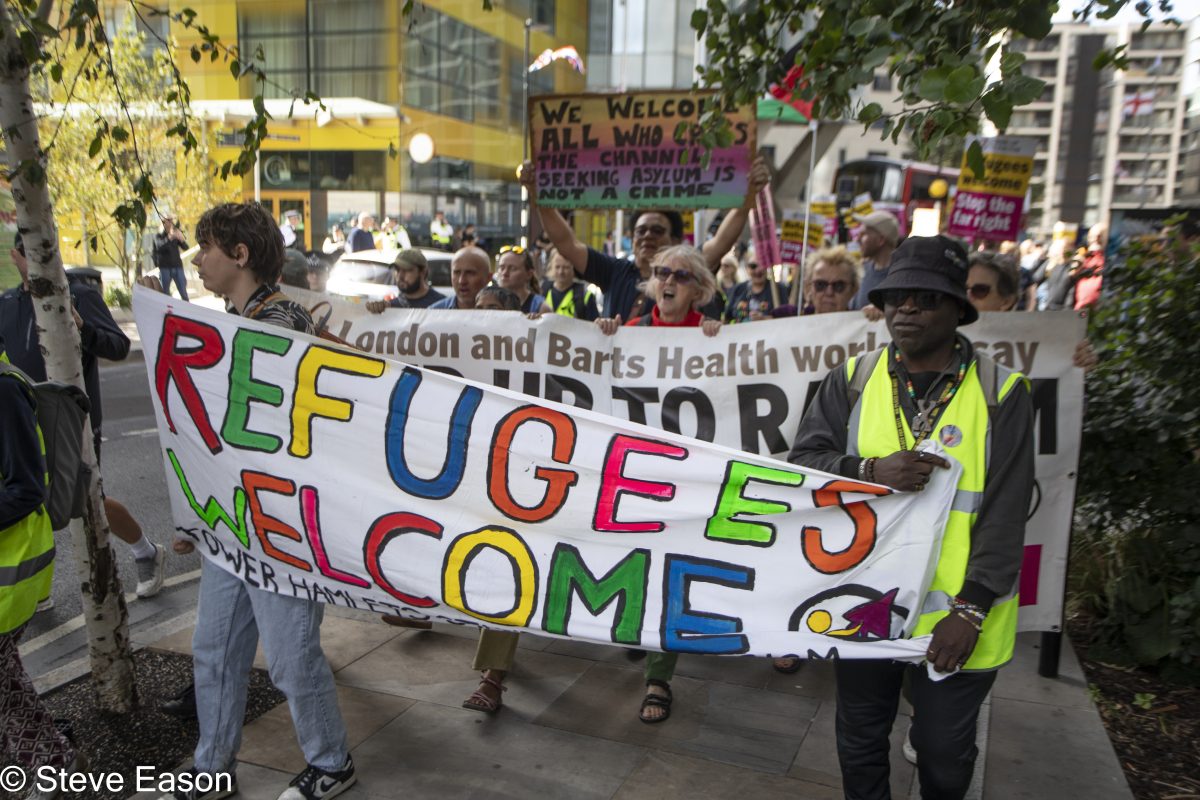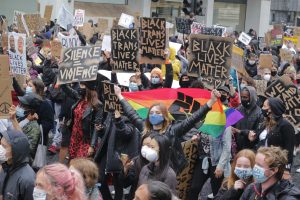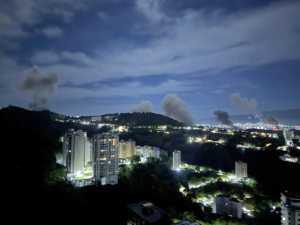
Interview | Race and Class in Crisis
Jaice Titus •Following their speech at rs21’s Festival of the Oppressed, Jaice Titus speaks to Elaliberta about race and Marxism. The interview was first published here.
Elaliberta: In your article ‘Stretching Marxism’, you characteristically demonstrated how Frantz Fanon, through the colonial experience, showed that ‘race and class are bound together as co-constitutive forces’ and thus a structural characteristic of capitalism. In light of this, is the racialisation of class within contemporary Britain rooted in its history of colonialism, or does it occur independently of this history?
Jaice: I spoke about Fanon because, in his attempt to deepen Marxism through a colonial lens he says, ‘Marxist analysis should always be slightly stretched every time we have to deal with the colonial problem’. He was doing something interesting with it. Rob Knox, in an article, employs this concept of ‘stretching’ to examine the relationship between race and class. I wanted to bring these perspectives into dialogue with what we are trying to do: engage with and expand Marx’s ideas for a contemporary world. Many Marxists approach the question solely through an economist’s lens, as while economics is crucial to understand capitalism, we only get a partial picture through it. Instead of being dogmatic, I want to develop Marx’s ideas through a range of thinkers who have tried to situate Marx within the period they were writing from, for instance Stuart Hall.
In the context of contemporary British politics, colonialism undoubtedly structures the forms through which racism continues to operate. We need to account for how capitalism itself has changed over time, through postcolonial societies and the process of globalisation. Yet race has often been mobilised as a discriminatory and disciplining tool in labour markets at moments of capitalist crisis. Colonialism is a crucial part of the story in Britain, and this links to other historical formations, such as the welfare state, which produced its own racialised ‘outsiders’.
Elaliberta: The far-right and fascist forces in Britain and across Europe centre their populist rhetoric on the perceived existential threat that migrants, especially refugees, pose to the interests of a nation’s people. Within the context of a deepening global economic crisis, where major capitalist economies are experiencing slowing growth rates, it has become evident that the anti-migrant rhetoric of both the ruling conservative right and social democracy is legitimising the more explicit xenophobic discourse of the populist far right, while also serving as a major contributor to their success. As you explain in your article, ‘economic decline is not explained through capitalism but through migration.’ How, then, are far-right parties such as Reform UK able to draw support from privileged middle- and upper-strata groups of people from ethnic and/or migrant backgrounds? And how are these strata themselves racialised?
Jaice: In the article, I mention that the far right tends to frame austerity and economic decline by blaming migrants, rather than with economic or class-based arguments. Over time, partly through the successes of antiracist movements and the establishment of formal equality in British society, sections of BME people have entered the bourgeois class. It is important to unpack the diversity of this category we refer to as BME. For instance, some British Indians are very wealthy, often coming from petit-bourgeois backgrounds such as pharmacy owners, while others work in care homes under precarious and low-paid conditions. The same is true across different racialised groups: class differences complicate things and we never arrive at a simple, uniform experience.
At the same time, we need to recognise how the state and capital are able to subsume and de-radicalise social movements. On one level, antiracist struggles have won important gains, which led to producing greater formal equality over time. I am simplifying it here. Yet these victories are often de-radicalised and absorbed. So, while in principle equality exists, in practice racialised inequalities persist: Black people continue to be disproportionately stopped by the police; anti-migrant rhetoric remains pervasive; and Islamophobia is widespread.
Elaliberta: What role does Islamophobia play within the British political environment?
Jaice: Islamophobia continues to be a key point of struggle in British politics. The so-called War on Terror normalised Islamophobia in British society and gave political expression to racism towards Muslims. This was carried out through the Prevent programme, for example, which many organisations consider a violation of human rights. The programme enabled parts of society to racialise Muslims and refer them to the state as extremists or terrorists. Public sector bodies, educational institutions, and other organisations were tasked with identifying people they believed to be radicalised, a process that created racial profiling, othering and racialisation.
We also see how the state’s treatment of Shamima Begum, who was born in Britain but rendered stateless, normalises state Islamophobia in the most extreme way. Similarly, the persistent poverty of Pakistani and Bangladeshi communities, among the poorest groups in Britain, shows how structural Islamophobia intersects with class inequality.
At the same time, the Palestine movement has galvanised British Muslims to act as agents of change and to stand up to the state. This is a positive step for the movement, and there is much to learn from how people organise and resist in this context.
Elaliberta: The racialisation of labour, idiosyncrasies aside, is clearly identifiable within Greece. However, it remains highly unlikely that a Greek prime minister could come from a migrant community. In your article, you state that ‘Rishi Sunak and Kemi Badenoch represent a new racialised elite.’ How is this made possible within Britain’s racially stratified class system?
Jaice: I think the success of the antiracists movements of the 70/80’s gave space to a layer of BME people, particularly the middle class as well as petit bourgeois, to embrace different kinds of politics; for example, some related to Thatcher and neoliberalism. But they also had to adopt right-wing, anti-migrant politics to be accepted by sections of the ruling class – you see that in the politics of almost all of them. I’d also add that while Rishi Sunak was PM, he was never elected into that role, he took over from Liz Truss. So in Britain we haven’t had an elected Prime Minister from a BME background.
Elaliberta: In ‘Stretching Marxism’ you speak of the ‘broader project of right-wing gender politics, which seeks to regenerate patriarchal authority under the guise of ‘protecting women’ and ‘defending children.’’ This statement cuts directly to the issue at hand: the role of the left as a tribune of the oppressed and as a force for social liberation across all forms of oppression. How, then, should the left relate to social-liberal parties that, while promoting ostensibly inclusive policies, simultaneously advance anti- labour economic programmes of austerity? Also, has there been a marked devolution of Britain’s inclusive political culture ?
Jaice: The right frequently invokes the rhetoric of ‘protecting women’ and ‘defending children,’ though in practice this often means protecting white women and children. We see this strategy actively mobilised by far-right organisations at the moment. Journalists have uncovered the hypocrisy at the heart of this narrative, with some of those voicing ‘legitimate concerns’ themselves perpetrators of violence against women. Clearly, these forces are not motivated by genuine concern for women’s safety. Yet the message nonetheless gains traction among sections of people searching for answers to their discontent with the world.
I think the way in which the media and the news talk about Muslim men and migrants adds to the problem, but this is only a partial answer. The left and antiracists haven’t been able to stake a ground in the debate successfully. The 2020 Black Lives Matter movement was an inspiring moment when police violence was linked to colonialism and empire, exemplified by the toppling of Edward Colston’s statue in Bristol Harbour. Workplaces, too, began to take race inequality more seriously. Yet the more liberal aspects of antiracism ultimately became dominant, particularly within workplace equality, diversity, and inclusion (EDI) initiatives. While I do not dismiss EDI training, since it can open important conversations among colleagues who might not otherwise discuss race, most left and union activists have failed to consolidate these openings into more militant, sustainable demands around racial justice. The left must hold social democratic parties to account when they promote inclusion on the one hand but pursue austerity on the other. Austerity disproportionately harms racialised communities.
I don’t believe the majority of people in Britain are inherently racist; many have instincts that lean towards fairness and solidarity. The task of the left should be to cultivate these instincts into active antiracism. That means drawing as many people as possible into antiracist activity, as well as creating political education spaces where people can debate, think through these issues collectively, and gain the confidence to act. In our increasingly fragmented and isolated society, such spaces are urgently needed. Perhaps the emerging left party in Britain could play a role in structuring this kind of political education and consciousness.
Elaliberta: There is a worrying tendency among sections of the broad left to display open hostility toward so-called ‘woke’ politics, LGBTQ+ policy reforms, and especially trans rights. Perhaps most characteristic of this trend are figures such as Sahra Wagenknecht in Germany and George Galloway in Britain, both of whom have also expressed support for restrictions on refugees and migrants. Is there, within Britain, a left that actively seeks to challenge this drift into unprincipled -anti-socialist politics?
Jaice: This is precisely why I wrote my talk for the Festival of the Oppressed event organised by rs21. We wanted to make a clear statement that issues around oppression cannot be dismissed, definitely not by anyone who calls themselves left wing. Women, migrants, trans people, and disabled people are all part of the working class and if we are serious about building a radical mass movement capable of fighting the oppressive structures of capitalism, then we must take their struggles seriously. I also think this is why we need to be continuously developing our politics, stretching Marxism, so it’s not dogmatic but evolving as the world is. For this we need organisations that allow these spaces for furthering our thoughts, not trying to transpose 20th century politics for every situation.










0 comments